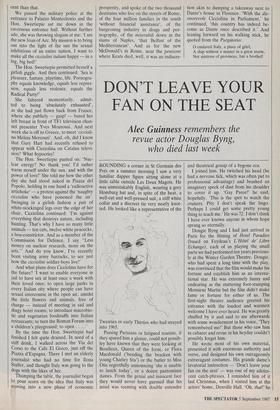DON'T LEAVE YOUR FAN ON THE SEAT
Alec Guinness remembers the
revue actor Douglas Byng, who died last week
ROUNDING a corner in St Germain des Pres on a summer morning I saw a very familiar dapper figure sitting alone at a little table outside Les Deux Magots. He was unmistakably English, wearing a grey Homburg hat and, in spite of the heat, a well-cut and well-pressed suit, a stiff white collar and a discreet tie very neatly knot- ted. He looked like a representative of the Twenties or early Thirties who had strayed into 1965.
Passing Parisians or fatigued tourists, if they spared him a glance, could not possib- ley have known that they were looking at Boadicea, Queen of the Iceni, or Flora Macdonald (`bending the bracken with young Charley Stu') or the butler to Miss Otis regretfully announcing 'she is unable to lunch today', or a dozen pantomime dames. From the genial and innocent face they would never have guessed that his mind was teeming with double entendre and theatrical gossip of a bygone era.
I joined him. He twitched his head (he had a nervous tick, which was often put to professional advantage) and brushed an imaginary speck of dust from his shoulder to cover it up. 'Gay Paree!' he said, hopefully. 'This is the spot to watch the cruisers. Pity I don't speak the lingo. Perhaps I could get some pretty young thing to teach me.' He was 72. I don't think I have ever known anyone in whom hope sprang so eternally.
Dougie Byng and I had just arrived in Paris for the filming of Hotel Paradiso (based on Feydeau's L'H Otel de' Libre Echange), each of us playing the small parts we had performed ten years previous- ly at the Winter Garden Theatre. Dougie, who had spent a long time with the play, was convinced that the film would make his fortune and establish him as an interna- tional star. He was extremely funny and endearing as the stuttering foot-stamping Monsieur Martin but the film didn't make fame or fortune for either of us. The first-night theatre audience greeted his entrance with the loudest and warmest welcome I have ever heard. He was greatly chuffed by it and said to me afterwards with some wonderment in his voice, 'They remembered me!' But those who saw him in cabaret and revue in his heyday couldn't possibly forget him.
He wrote most of his own material, presented it with enormous authority and verve, and designed his own outrageously extravagant costumes. His grande dame's lavatorial instruction — 'Don't leave your fan on the seat' — was one of my adoles- cent catch-phrases. I reminded him of it last Christmas, when I visited him at the actors' home, Denville Hall. 'Oh, that!' he said. 'ft shocked some people, you know. Nowadays they are all unshockable. I don't know what the world is coming to. Time for people like me to go.'
And he has gone. The last time I saw him he was rather tetchy, which was unlike him. He was lovingly cared for at Denville Hall and the afternoon I called he had three kindly members of the staff in his room attending to his wants and laughing rather nervously at his jokes, which he expressed with a certain acidity. 'It's use- less talking to these women,' he snapped. `They are abysmally ignorant. None of them has even heard of Delicia, or Dorothy Ward. You can't have an intelli- gent conversation in this place.'
I am told that a week before died, discussing funerals with a friend, he said, don't care what they do with me or my box. The only sort of box I'm interested in is a full box at Daly's or the Gaiety.'



















































 Previous page
Previous page